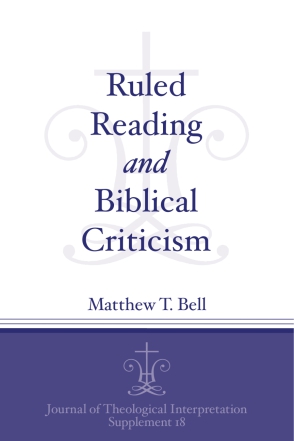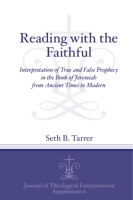Ruled Reading and Biblical Criticism
Matthew T. Bell
“Bell’s book is a welcome articulation of theological interpretation as a critically engaged task. This is a significant work particularly as the project of defining and pursuing the theological interpretation of Scripture in our times continues to develop.”
- Description
- Reviews
- Bio
- Table of Contents
Modern prejudice holds that ancient Christian interpretation was relatively unconcerned with history and concomitantly determined to foist extrascriptural doctrinal commitments onto scripture, silencing those layers of scripture’s meaning that modern criticism has been most concerned with uncovering. In this book, Bell argues that, when the ethos and theology of reading in the early Church are taken into account, premodern interpretive priorities turn out to be less implausible than the modern world has believed them to be. Through close reading of ancient Christian texts, Bell outlines an ontology of scripture wherein the relationship between early Christianity’s “Rule of Faith,” on one hand, and its scriptures, on the other, was expressly constructed as a hermeneutical spiral, the slant of which was designed to attend to and be edified by textually mediated conundrums and intellectual provocations. Viewed along that spiral, the Church’s Rule was as “scriptural” as the Church’s catalog of scriptures was “ruled.”
This book will be welcomed by academics who study early Christianity and scripture, as well as scholars interested in reconsidering Christian hermeneutical questions for a postmodern age.
“Bell’s book is a welcome articulation of theological interpretation as a critically engaged task. This is a significant work particularly as the project of defining and pursuing the theological interpretation of Scripture in our times continues to develop.”
Matthew T. Bell is Visiting Instructor in Computer Science at Whitworth University and a bivocational pastor at Shadle Park Presbyterian Church in Spokane, Washington.
Acknowledgments
Introduction
Chapter 1: Communion, Canon, and the Bible of the Church
Chapter 2: Ontology of Scripture and Indwelling Salvation’s Epic (Or, Whose Identity Story?)
Chapter 3: The Legacy of Modernity and the Methodological (Pre?)Occupations of a Critical Age
Chapter 4: A Case Study in “Postmodern” Ruled Reading
Ruled Reading in the Unfolding Epic: Concluding Reflections on the Arts of Homily and Devotional Criticism
Bibliography
Author / Subject Index
Also of Interest
Mailing List
Subscribe to our mailing list and be notified about new titles, journals and catalogs.






